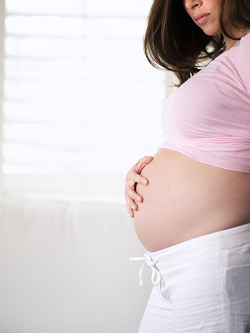fitness news
![]() ,
,![]()
Font size Fertility & Pregnancy
High maternal BMI linked to poor pregnancy outcomes
– Reported April 25, 2014
 Women who have a high body mass index before pregnancy or in the early stages of pregnancy have a much higher risk of fetal death, stillbirth and infant death than women with a normal one, according to new research published in the journal JAMA.
Women who have a high body mass index before pregnancy or in the early stages of pregnancy have a much higher risk of fetal death, stillbirth and infant death than women with a normal one, according to new research published in the journal JAMA.
The research team, led by Dagfinn Aune of Imperial College London in the UK, states that previous studies have shown an association between maternal body mass index (BMI) – before or during the early stages of pregnancy – and increased risk of fetal death, stillbirth, perinatal death (stillbirth and early neonatal death), neonatal death (death in the first 28 days after birth) and infant death.
However, they say that such studies have not established the optimal pre-pregnancy BMI that may prevent the risk of these pregnancy complications.
With this in mind, Aune and colleagues conducted a review of 38 studies that reported on maternal BMI and the risk of pregnancy complications. The studies included 10,147 fetal deaths, 16,273 stillbirths, 4,311 perinatal deaths, 11,294 neonatal deaths and 4,983 infant deaths.
The researchers divided the women into the following BMI groups:
Normal weight (BMI 18.5-25)
Overweight (BMI 25-30)
Obese (BMI 30-35)
Moderately obese (BMI 35-40)
Severely obese (BMI 40-45).
Severely obese women have greatest risk of poor pregnancy outcomes
The researchers found that even small increases in maternal BMI were linked to a higher risk of fetal death, stillbirth, neonatal death, perinatal death and infant death.
Pregnant woman eating chips
Researchers found that even small increases in BMI were linked to a greater risk of poor pregnancy outcomes.
Maternal BMI over 40 was associated with the greatest risk. Women in this category had around a 2- to 3-fold increase in risk of such outcomes, compared with women with a BMI of 20.
Although the investigators say further research is warranted to determine why higher maternal BMI increases the risk of poor pregnancy outcomes, they point out that past studies have suggested that being overweight or obese may increase the risk of preeclampsia, gestational diabetes, type 2 diabetes, gestational hypertension and congenital anomalies.
They say these are also conditions that have been linked to increased risk of fetal and infant death.
According to the World Health Organization (WHO), approximately 3 million neonatal deaths occurred in 2012, while 73% of all under-5 deaths occurred in the first year of life. In addition, around 7,200 stillbirths occur every day.
Considering the global burden of poor pregnancy outcomes, the research team says their latest findings should be taken into account.
They add:
“Even modest increases in maternal BMI were associated with increased risk of fetal death, stillbirth, neonatal death, perinatal death, and infant death.
Weight management guidelines for women who plan pregnancies should take these findings into consideration to reduce the burden of fetal deaths, stillbirths, and infant deaths.”
However, the researchers say there are some limitations to their analysis. The team notes that not all studies they reviewed accounted for factors that may have influenced a woman’s risk of pregnancy complications.
Furthermore, they note that the majority of studies involved in their analysis were from Europe and North America, where fetal and infant death rates are significantly lower than low- and medium-income countries. “Thus,” they add, “it is unclear whether the results can be generalized to other settings.”
Medical News Today recently reported on a study suggesting that pregnant women are more susceptible to a certain bacteria, which could put them at higher risk of fetal loss, preterm birth and stillbirth.